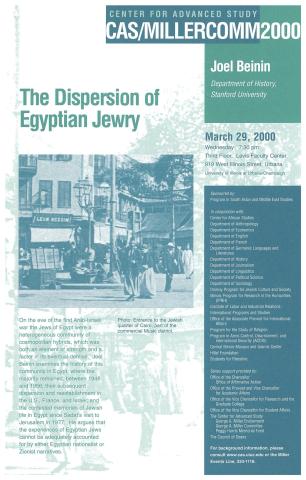The Dispersion of Egyptian Jewry
Third Floor, Levis Faculty Center
919 W. Illinois St.
Urbana
On the eve of the first Arab-Israeli war the Jews of Egypt were a heterogeneous community of cosmopolitan hybrids, which was both an element of strength and a factor in its eventual demise. Joel Beinin examines the history of this community in Egypt, where the majority remained, between 1948 and 1956; their subsequent dispersion and reestablishment in the U.S., France, and Israel; and the contested memories of Jewish life in Egypt since Sadat's visit to Jerusalem in 1977. He argues that the experiences of Egyptian Jews cannot be adequately accounted for by either Egyptian nationalist or Zionist narratives.
Sponsored by: Program in South Asian and Middle East Studies
In conjunction with: Center for African Studies, Department of Anthropology, Department of Economics, Department of English, Department of French, Department of Germanic Languages and Literatures, Department of History, Department of Journalism, Department of Linguistics, Department of Political Science, Department of Sociology, Drobny Program for Jewish Culture and Society, Illinois Program for Research in the Humanities (IPRH), Institute of Labor and Industrial Relations, International Programs and Studies, Office of the Associate Provost for International Affairs, Program for the Study of Religion, Program in Arms Control, Disarmament, and International Security (ACDIS), Central Illinois Mosque and Islamic Center, Hillel Foundation, Students for Palestine.
Department of History, Stanford University

